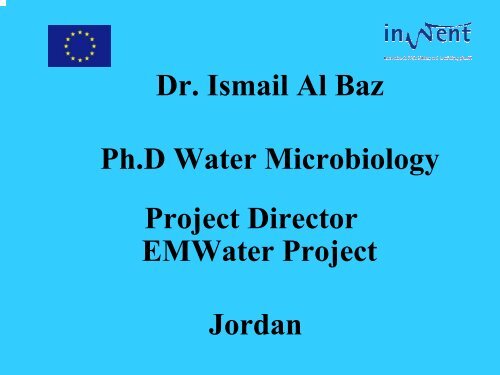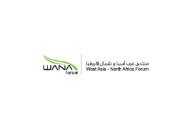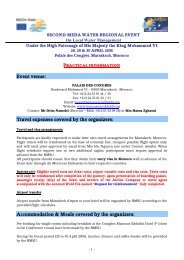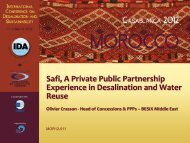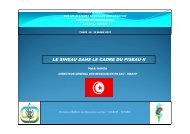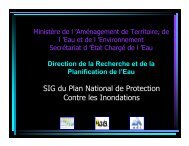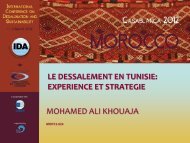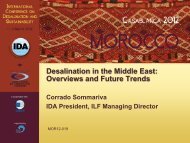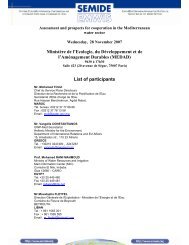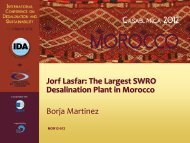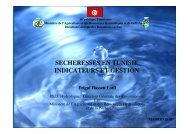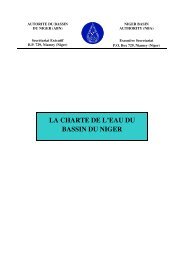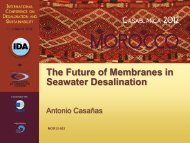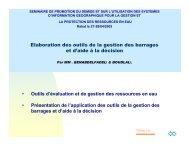Dr. Ismail Al Baz Ph.D Water Microbiology Project Director ... - emwis
Dr. Ismail Al Baz Ph.D Water Microbiology Project Director ... - emwis
Dr. Ismail Al Baz Ph.D Water Microbiology Project Director ... - emwis
- No tags were found...
You also want an ePaper? Increase the reach of your titles
YUMPU automatically turns print PDFs into web optimized ePapers that Google loves.
<strong>Dr</strong>. <strong>Ismail</strong> <strong>Al</strong> <strong>Baz</strong><br />
<strong>Ph</strong>.D <strong>Water</strong> <strong>Microbiology</strong><br />
<strong>Project</strong> <strong>Director</strong><br />
EM<strong>Water</strong> <strong>Project</strong><br />
Jordan
EM<strong>Water</strong> <strong>Project</strong><br />
Effiecient Management of Wastewater , its Treatment<br />
and Reuse in the Mediterranean Countries<br />
2003 - 2007<br />
Funded by the European Union<br />
Implemented by InWEnt
InWEnt -"Internationale Weiterbildung und Entwicklung"<br />
gGmbH<br />
Capacity Building International, Germany<br />
The merger between the:<br />
Carl Duisberg Gesellschaft (CDG)<br />
and<br />
German Foundation for International Development(DSE)
Business fields continue the prior work<br />
of the CDG and DSE:<br />
• Training of specialists and political decision makers in<br />
development cooperation<br />
• International dialogue and exchange of experience<br />
• International and intercultural qualification of specialists,<br />
directors and up-coming professionals from Germany and<br />
other industrial countries<br />
• Preparing German development experts for their foreign<br />
assignments<br />
• Domestic development-based political information and training<br />
programs
MEDA Progamme<br />
• In 1995 the European Union has started the<br />
MEDA Programme (Euro-Mediterranean<br />
Partnership)<br />
• The Programme shall improve the<br />
infrastructure in the so called MEDA Countries<br />
• Objective is the establishment of the Euro-<br />
Mediterranean Free-Trade Area in 2010
Euro-Mediterranean <strong>Water</strong> Network<br />
• Important Milestone in this process has been the<br />
establishment of the Euro-Mediterranean <strong>Water</strong> Network in<br />
1999<br />
• The Euro-Mediterranean <strong>Water</strong> Network shall strengthen the<br />
regional cooperation between the MEDA Countries in the field<br />
of water supply and<br />
wastewater management
<strong>Water</strong> in the Middle East<br />
• <strong>Water</strong> is an essential element for the economic<br />
development and political stability in the whole region<br />
• Limited water resources are recognised as the most important<br />
obstacle to the development of the agricultural sector<br />
• Aspects of decentralisation and privatisation are increasingly<br />
taken in consideration to enhance the efficiency of water<br />
management
MEDA 2003-2007<br />
Target countries:<br />
Turkey<br />
Lebanon<br />
Palestine Jordan<br />
Target areas:<br />
• Rural areas (5.000 -10.000 inhabitants)<br />
• Peri-urban areas with insufficient waste water treatment<br />
facilities
Situation in the beneficiary countries<br />
• In all of these countries, wastewater treatment is not sufficient<br />
• High water losses in the drinking water supply<br />
(average between 30%-50%)<br />
• Rural and peri-urban areas are mostly neglected from water<br />
and wastewater facilities (average between 20-30% coverage<br />
while in cities 50-90%)
• Jordan and Palestine belong to the countries which<br />
are most affected by water scarcity worldwide<br />
• Availability of renewable water resources are below<br />
500m³ per capita and year
<strong>Project</strong> - Objectives and Purposes<br />
• Implementation of technical guidelines for wastewater<br />
• Strengthening the exchange of experience<br />
• Cooperation between the Mediterranean Countries (South-<br />
South Cooperation) and between the EU Countries (North-<br />
South Cooperation)<br />
• Development and application of low-cost solutions
Fields of Action<br />
• Analysis and estimation of the local situation<br />
• Practical work through sampling and analysing programs<br />
• Development of policy guidelines<br />
• Training of stakeholders and professionals<br />
• Design and construction of pilot plants<br />
• Organisation of workshops and a regional conference
Participation and Promotion of<br />
Environmental Awareness<br />
through:<br />
• <strong>Al</strong>l stakeholders<br />
• User and consumer associations<br />
• Women organisations<br />
• Environmental protection organisations
Partners<br />
• InWEnt- Internationale Weiterbildung und Entwicklung gGmbH<br />
• Yildiz Technical University, Yildiz, Turkey<br />
• Balamand University, Tripoli, Lebanon<br />
• Birzeit University, Birzeit, Palestine<br />
• <strong>Al</strong> al-Bayt University, Mafraq, Jordan<br />
• Technische Universität<br />
Hamburg-Harburg<br />
• Adelphi Research gGmbH<br />
• ENEA- Ente per le Nuove<br />
Tecnologie, L´Energia e<br />
L´Ambiente
Expected Results<br />
• Policy guidelines for efficient wastewater treatment<br />
• Reuse standards<br />
• Human resources development<br />
• Computer based training<br />
• Pilot Plants for demonstration<br />
• Increased public awareness<br />
• Increased environmental protection
<strong>Project</strong> first year achievements<br />
• Country studies for the MEDA countries is now finished and<br />
ready for publication<br />
• Training programs local, regional and web-based<br />
announcement, selection of participants and module<br />
development is now finalized.<br />
• Implementation of training programs will take place between<br />
June and October 2004 in the MEDA Countries.
• <strong>Project</strong> web-site is established and used actively by all<br />
project members.<br />
• EU and MEDA partners meetings has been successfully<br />
organized.<br />
• Coordination with local stakeholders and international donor<br />
organization in the region is going well.<br />
• Active participation in regional water conferences (<strong>Water</strong><br />
Demand Conference in Dead Sea, Jordan) and other<br />
conferences to present project results.<br />
• Dissemination of project information is continuously done<br />
through project brochures and announcement in different<br />
specialized journals.
• Procedures for procurement of the pilot plant and time plan for<br />
design and construction is established<br />
• Report writing and financial management of the project is also<br />
functioning well.<br />
• Coordination meetings with EU representatives in the region is<br />
going continuously<br />
• Established of taskforces within partners including:<br />
‣ Pilot plant design and construction<br />
‣ Web-based training<br />
‣ Training programs<br />
‣ Low cost technologies
Constrains<br />
Difficulties in communication due to the huge number of<br />
partners and different work mentalities.<br />
Difficulties by follow up the EU guideline for financial<br />
management.<br />
The high working load due to staff limitation.<br />
Political restrictions in the region e.g. Palestine.<br />
Difficulties by NGOS involvement in the project in some<br />
countries due to special country conditions.


